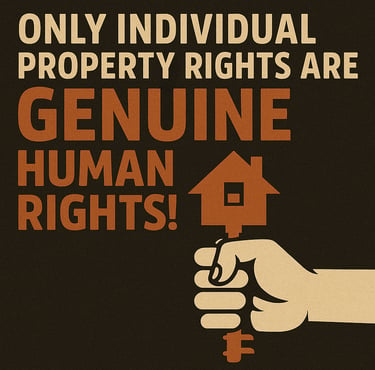The Principles of Natural Law
People come into conflict with each other when they want to use the same physically scarce thing as a means to different ends at the same time. The very purpose of the institution of law and legal norms is to avoid and remedy conflicts between human beings. Conflicts can only be avoided if people have exclusive access to scarce resources. This exclusive access is called a property right. A property right is understood as the right of a person to the free use and exclusive control of a scarce physical object. Property rights mark the scope and limits of a person's freedom. Only where property rights are fully recognized can people cooperate freely and peacefully and create prosperity. All conflicts, economic grievances and wars between people can be traced back to violations of property rights. If justice, freedom, prosperity and peace are to exist sustainably in a society, the moral principles of universal natural law must be respected and protected absolutely.
The fundamental logical rules of natural law are the innate and inalienable rights of human beings to...
Self-ownership: Ownership of oneself, one's body, one's life and one's labor force.
Original appropriation: Ownership of previously ownerless natural resources (land, mineral resources) based on initial appropriation through one's own labor.
Production: Ownership of all products that are produced from the originally appropriated resources of nature through one's own labor.
Exchange: Ownership of natural resources, manufactured products, services or generally accepted means of exchange (money) that are transferred from one owner to another through voluntary contracts.
Universal legal equality: All these property rights are universally valid without exception. This means that they apply always, everywhere and to everyone to the same extent and that no special rights exist for anyone.
Non-aggression: If all these property rights can be claimed by every human being, it follows that every human being is obliged to respect them unconditionally towards every other human being. The non-aggression principle (NAP) therefore states that no one may damage, use or expropriate the property of another individual without his consent.
Free Will: The freedom of one's own will, the voluntariness of one's actions and the self-determination of an individual in dealing with his property must never be restricted by the arbitrary coercion of other people (i.e. by their own free will).
Neutral Judges: The mediator, judge or final arbiter of a conflict must never be involved in the conflict as a party.
Self-defense and defense of others: In the event of obvious and demonstrable violation of these absolute property rights against oneself or others, every person has the right to engage in self-defense or emergency assistance.




